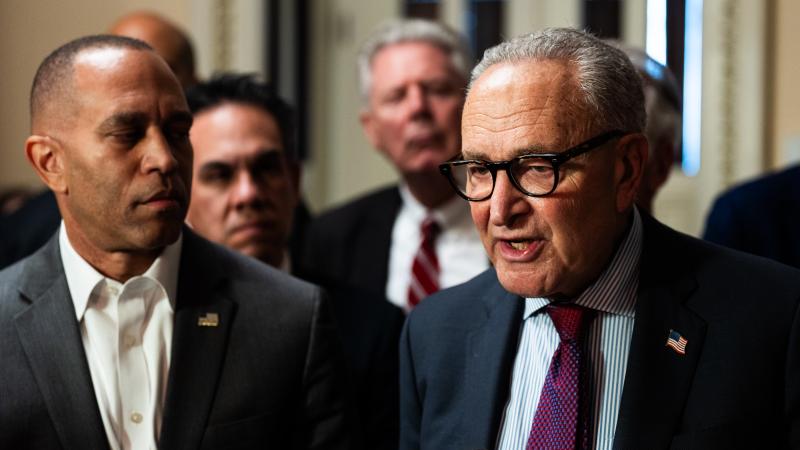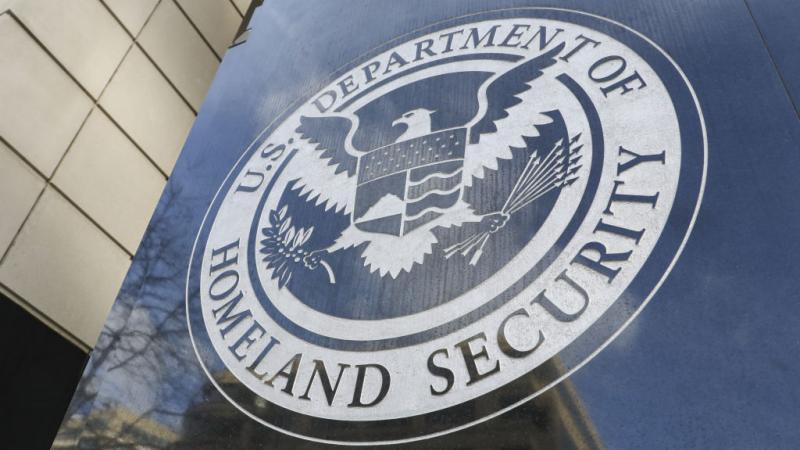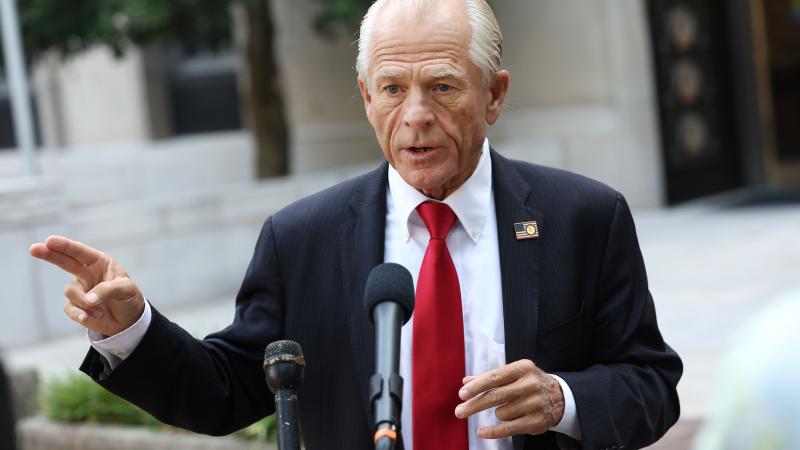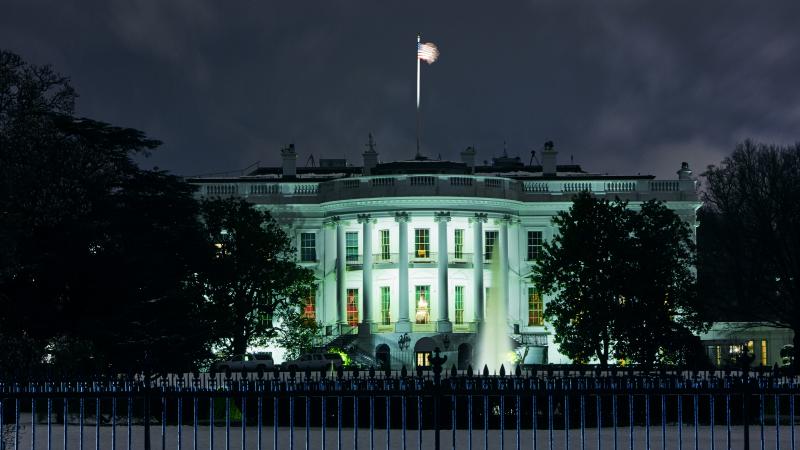House Judiciary Chair Jim Jordan lays out sweeping agenda for judicial reform
Republicans in Congress have zeroed in on federal judges unilaterally blocking key Trump executive orders on immigration and government reform. The Constitution gives Congress the right to delineate the authority of district courts.
As President Donald Trump faces stiff challenges from federal judges across the country, House Judiciary Committee Chairman Jim Jordan, R-Ohio, is laying out a sweeping agenda for judicial reform to rein in judges that he says are being overtly political.
In just under 65 days of President Trump’s second term, federal judges have issued at least 15 nationwide injunctions, where single judges on the district court level have attempted to block certain administration policies nationwide. Republicans have roundly decried the injunctions because of their sweeping nature and have accused some of the judges of being motivated by politics instead of sound legal arguments.
“[When] you have a judge whose behavior is so politically, so political against President Trump, you kind of got to start asking the question, really, is this just a bad judicial decision, or is this based on politics?” Jordan told the “Just the News, No Noise” TV show on Tuesday.
Three reforms being proposed
Jordan, who leads the House committee responsible for overseeing the federal law enforcement and court system, told Just the News that he is planning to address reforms to the judicial system in three ways: passing legislation to limit nationwide injunctions by individual federal judges; wielding Congress’s appropriations power to curtail judicial activism; and conducting hearings on judicial conduct.
“[There’s] three avenues that Congress has to deal with this situation. One is legislative, and we're already working on that. We've passed the bill out of committee two and a half weeks ago that the Speaker has indicated they're gonna put on the floor next week. But that bill says, when you have one of these federal district judges who issues an injunction, you know, some some judge in Timbuktu California issues an injunction, it should only apply to parties in the case and in that respective jurisdiction, it shouldn't have nationwide application. So we think that makes sense,” Jordan said.
The Judiciary Committee last week approved the “No Rogue Rulings Act of 2025” sponsored by Rep. Darrell Issa, R-Calif. That legislation would curtail federal judges from making nationwide injunctions in the cases before them, “except in the case of such an order that is applicable only to limit the actions of a party to the case before such district court with respect to the party seeking injunctive relief from such district court and non-parties represented by such a party acting in a representative capacity.”
The bill would provide a new pathway for injunctive relief in cases where three or more states challenge a federal law. In such a case, the challenge would be referred to a three-judge panel selected randomly which would be given the authority to issue the types of nationwide injunctions currently being used by individual federal judges.
The administration has so far faced dozens of lawsuits, mostly over Trump’s executive orders and the actions of Elon Musk’s Department of Government Efficiency, resulting in injunctions—known as Temporary Restraining Orders—that freeze administration policies as the case is adjudicated. Most of the injunctions have come from the Democratic-friendly Maryland or DC courts, though their rulings currently apply nationwide, frustrating efforts by Trump to enact his agenda.
The deportation case
One case that has garnered nationwide attention is being presided over by Judge James Boasberg of the Washington, D.C., District Court. The case centers around Trump’s invocation of the 1798 Alien Enemies Act to deport members of the Venezuelan gang Tren de Aragua.
The administration argued that the judge’s order infringes on the president’s Article II executive powers, leading its lawyers to assert the state secrets privilege to decline to provide additional information on the deportation of the gang members demanded by Boasberg. The Trump administration has appealed the case to the D.C. Circuit Court of Appeals, which upheld the temporary injunction in a ruling on Wednesday.
But, if the House Republican bill becomes law, judges like Boasberg would not be able to issue such sweeping injunctions that halt federal policy.
Jordan said his committee will also explore ways to use Congress’ appropriations power to exercise influence over judges they believe have gone rogue. Second, “you can look at the appropriations process,” Jordan told the “Just the News, No Noise” TV show.
The United States Constitution separates the Supreme Court and the Congress, the Founders gave lawmakers the authority to regulate and organize all lower federal courts. This means that Congress is responsible for appropriating funds for federal court budgets—including salaries and other operating expenditures. Every year, Congress passes a judicial budget for the Financial Services and General Government, according to the Congressional Research Service.
Jordan also promised that his committee will conduct oversight hearings on the federal judiciary and the judges that have blocked the Trump administration’s policies.
Boasberg's political background muddies the waters
“[Finally], you do oversight. We're planning hearings. The first hearing would start next week, next Tuesday, and we'll announce those witnesses as soon as we finalize them,” Jordan said. “Then I think in those hearings, we'll focus on the injunction issue, but also into this ruling, this order, from Judge Boasberg, which, I mean, just on its face, is so ridiculous.”
Jordan also raised concerns about Boasberg’s history, specifically his role leading the FISA court during the Trump-Russia collusion investigation and attending a junket to an event sponsored by anti-Trump academics and speakers.
In his role as the head of the FISA Court, Boasberg made a number of divisive decisions, including a slap on the wrist for a member of the FBI’s Crossfire Hurricane team, the appointment of officials who had defended the FBI’s actions during the Russiagate saga, and the renewal of the FBI’s FISA powers, Just the News reported last week.
Boasberg also attended a privately-funded legal conference in Idaho that featured sponsors and speakers who have expressed clear anti-Trump sentiments — particularly on immigration — and a theme that echoed the Democrat Party’s 2024 stated mission of saving democracy, according to a judicial ethics report, Just the News reported earlier this week.
Some House Republicans have filed articles of impeachment against at least three of the federal judges who have issued injunctions in key cases, including Boasberg. Rep. Brandon Gill, R-Texas, who filed the articles of impeachment, accused him of abuse of power, and asserted that he "did knowingly and willfully use his judicial position to advance political gain while interfering with the President's constitutional prerogatives and enforcement of the rule of law.”
President Trump also called for the judges to face impeachment, saying "this judge, like many of the Crooked Judges’ I am forced to appear before, should be IMPEACHED!!! WE DON’T WANT VICIOUS, VIOLENT, AND DEMENTED CRIMINALS, MANY OF THEM DERANGED MURDERERS, IN OUR COUNTRY."
The Facts Inside Our Reporter's Notebook
Links
- judges have issued at least 15 nationwide injunctions
- Just the News, No Noise
- No Rogue Rulings Act of 2025
- so far faced dozens of lawsuits
- Maryland or DC courts
- invocation of the 1798 Alien Enemies Act
- assert the state secrets privilege
- upheld the temporary injunction
- gave lawmakers the authority
- the Congressional Research Service
- made a number of divisive decisions
- attended a privately-funded legal conference
- filed articles
- of impeachment
- abuse of power
- face impeachment















